Exhausted, disoriented evacuees wait, worry, wonder in Winnipeg
Read this article for free:
or
Already have an account? Log in here »
To continue reading, please subscribe:
Monthly Digital Subscription
$0 for the first 4 weeks*
- Enjoy unlimited reading on winnipegfreepress.com
- Read the E-Edition, our digital replica newspaper
- Access News Break, our award-winning app
- Play interactive puzzles
*No charge for 4 weeks then price increases to the regular rate of $19.95 plus GST every four weeks. Offer available to new and qualified returning subscribers only. Cancel any time.
Monthly Digital Subscription
$4.99/week*
- Enjoy unlimited reading on winnipegfreepress.com
- Read the E-Edition, our digital replica newspaper
- Access News Break, our award-winning app
- Play interactive puzzles
*Billed as $19.95 plus GST every four weeks. Cancel any time.
To continue reading, please subscribe:
Add Free Press access to your Brandon Sun subscription for only an additional
$1 for the first 4 weeks*
*Your next subscription payment will increase by $1.00 and you will be charged $16.99 plus GST for four weeks. After four weeks, your payment will increase to $23.99 plus GST every four weeks.
Read unlimited articles for free today:
or
Already have an account? Log in here »
Hey there, time traveller!
This article was published 29/05/2025 (226 days ago), so information in it may no longer be current.
More than 17,000 northern Manitobans scrambled to flee wildfires Wednesday night after Premier Wab Kinew declared a provincial state of emergency and ordered several communities to evacuate.
These are some of their stories.
Rob Burroughs, 57, evacuated from Flin Flon
Burroughs, a former firefighter, didn’t wait for an evacuation notice to pack his bags and get out of Flin Flon.
“I was already getting ready. I knew that wind was going to shift, it was only 1.5 kilometres away and out of control still, and we knew it was going to come our way,” he said Thursday morning at Century Arena in south Winnipeg which, along with Erik Coy Arena in Charleswood and Billy Mosienko Arena in Tyndall Park, were opened by the city Thursday to serve as evacuee reception centres where people can register with the Red Cross and rest, if they have nowhere else to go.
Vehicles line up leaving Flin Flon Wednesday evening.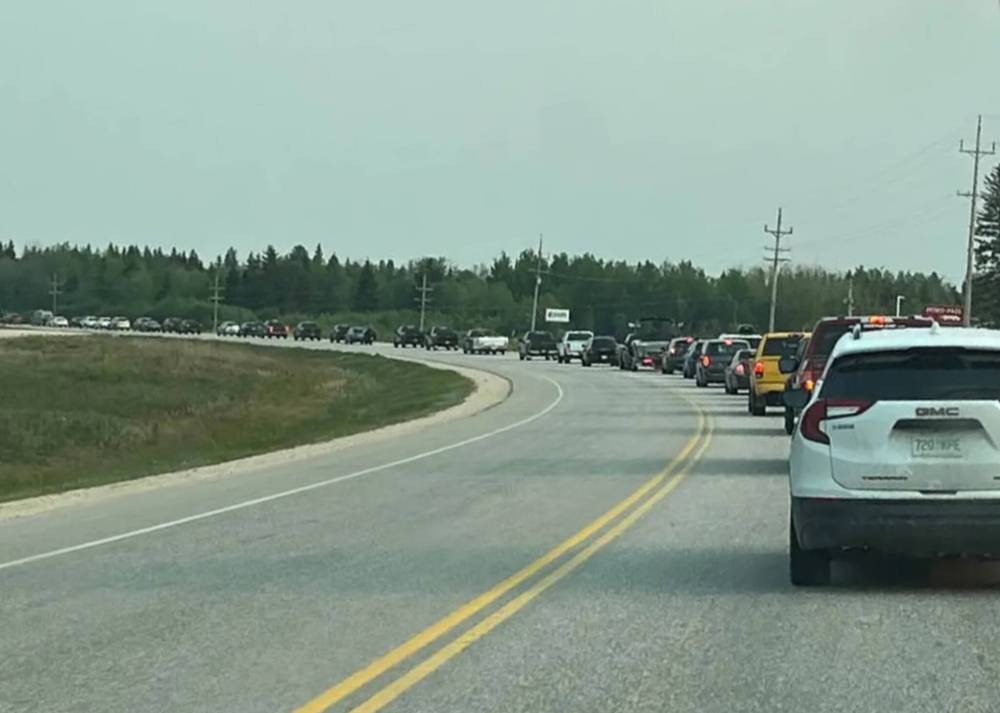
Around 5:30 Wednesday evening, Burroughs said notices on his phone, social media and the radio ordered everyone out of the city located just inside the Saskatchewan border, about 830 kilometres northwest of Winnipeg.
Burroughs and his common-law partner loaded up their truck with their children, three rescue dogs and a few necessities and began the 12-hour journey to Winnipeg, unsure when they would be able to go home and what they would be going home to.
Their journey was slowed significantly by 5,000 other residents doing the same thing.
“It took three hours to get to The Pas, which only should take an hour and 10 minutes,” Burroughs said. “It was unreal. Ahead of us, behind us, there was just nothing but headlights.”
MIKAELA MACKENZIE / FREE PRESS Rob Burroughs walks his dog Gunner on Thursday beside the Century Arena, after spending hours on the road driving to Winnipeg from Flin Flon.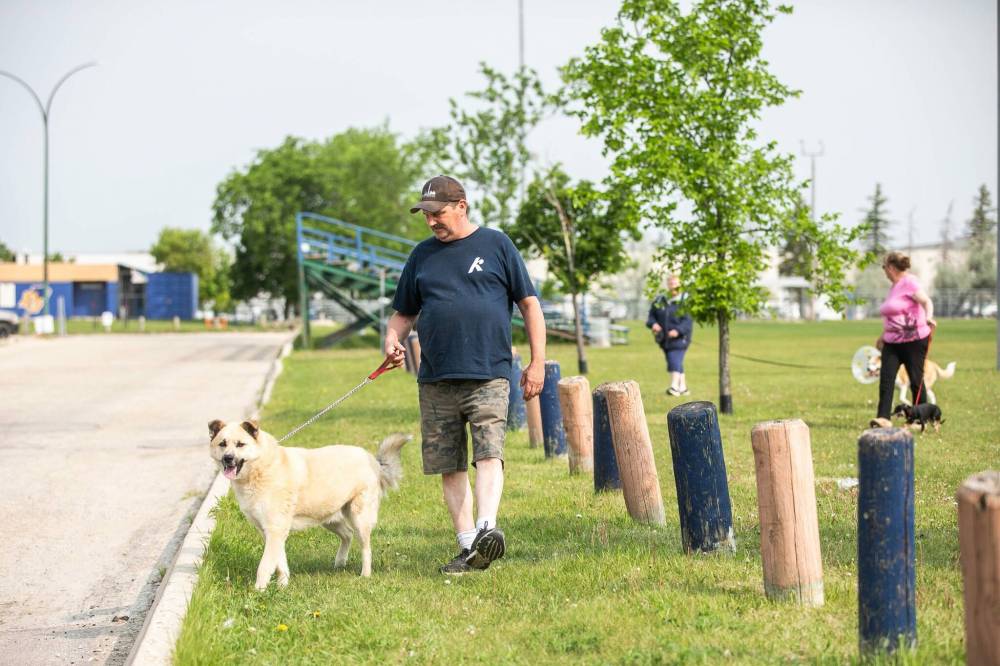
They drove through the night and arrived in Winnipeg at 6:30 a.m.
A few hours later, the family was on the hunt for dog leashes and some breakfast before figuring out where they were going to spend the night.
Burroughs said he has a hotel booked Friday, but feels for his neighbours still making their way to safety.
“It was bad enough getting here in a 12-hour trip, but what happened to the people that are still trying to get here? They’re they’re still seven, eight hours away, and that’s a long night for them too,” he said.
Kiele Kittle, 26, evacuated from Flin Flon
After hearing “Code Black” broadcast over the intercom inside Flin Flon’s Walmart Wednesday afternoon, Kittle packed into a car with her sister, her sister’s two kids and three cats. As they were grabbing supplies, trucks were driving around their neighbourhood with speakers ordering residents to evacuate.
They drove nine hours to North Battleford, Sask. to stay with family because Kittle was worried all the hotels were full in Winnipeg and Brandon.
The threatening flames and smoke loomed in the distance as they drove away.
A photo of the wildfire outside of Flin Flon taken around 3:45 a.m. Wednesday.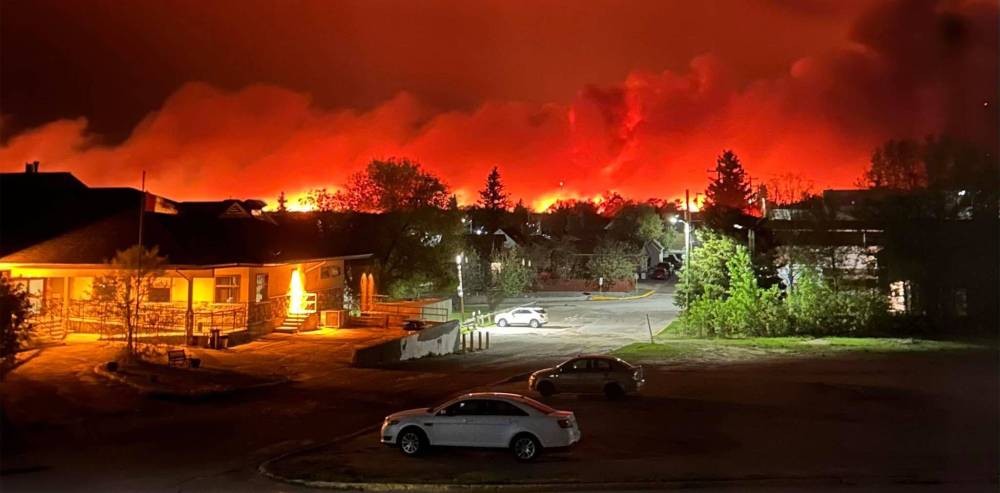
“You really feel like the world is ending. You just feel sick to your stomach… I’m never going to get that out of my head,” she said.
She had a bag with a couple of changes of clothes in her car but quickly ran back inside to grab some snacks, photo albums, electronics and cat litter.
On the road, she feared there wouldn’t be a home for her to return to.
“I just bought my house two years ago,” she said. “I’m getting my life established right now.”
Kittle works as high school teacher in Creighton, about five kilometres across the border in Saskatchewan. On Tuesday, before the evacuation notice was announced, Kittle and her students were glued to the window watching the smoke rise. She sent the students home early to be with their families.
“I couldn’t teach, it was so hard to focus,” she said. “I’m definitely hoping all my kids are safe.”
Freedom Castel, 40, evacuated from Mathias Colomb Cree Nation
One hour after touching down in Winnipeg Thursday afternoon, Castel stood outside the Best Western Plus Winnipeg Airport Hotel, waiting for a bus to take her and her six children — ages three to 18 — to the Billy Mosienko Arena in Tyndall Park.
Before they fled Mathias Colomb, the air was thick with acrid smoke, transforming the community where she was born and raised into something more “like the apocalypse,” Castel said.
The family had been without power on the First Nation, and it had been three days before any of them had eaten anything substantial, she said. They were eager to get to the Keewatin Street arena, one of three opened by the city to help evacuees.
“I’m tired and grumpy and hungry,” Castel said, one child slung over her shoulder, another clinging to her hip. “We might even be here for a month, who knows?”
Darla Blacksmith, 38, evacuated from Pimicikamak Cree Nation
Blacksmith was one of about 300 people pre-emptively evacuated from Pimicikamak as fire conditions worsened throughout last weekend. She arrived in Winnipeg Monday and was separated from her two teenage children, who were taken to Norway House to await transport to Winnipeg.
Blacksmith expected the teens to arrive on a flight Thursday, and was desperate to reconnect. She’s had limited communication with them because they do not have cellphones, she said.
“I’m just scared for my kids. I’m worried about them. I didn’t even sleep because I am thinking about them so much,” she said.
Blacksmith described how extreme smoke conditions made it difficult to breathe and see in Pimicikamak.
“Ashes are falling already,” she said. “A lot of people are scared.”
The Red Cross had arranged a hotel room for the family on Pembina Highway, and they were told to expect to use the accommodations until at least June 9, Blacksmith said.
Jack Selma, 47, evacuated from Pimicikamak Cree Nation (Cross Lake)
Selma, who lives in Happy Valley-Goose Bay, NL., was staying at a family centre near Cross Lake with his girlfriend Anna Williams and three-year-old son when the wildfires broke out.
The family was rushed to Norway House Wednesday afternoon, and then flown to Winnipeg alongside more than 50 other evacuees that evening, Selma said.
“It was kind of scary looking at the smoke and the sky, it was a very dark orange colour. It was very strong, too, the smell of the smoke. I felt bad for people who have respiratory problems,” Selma said.
MIKE DEAL / FREE PRESS Jack Selma, outside the Victoria Inn Hotel on Wellington Avenue, was waiting for a taxi to take him to the airport for a flight home to Happy Valley-Goose Bay, Nfld. 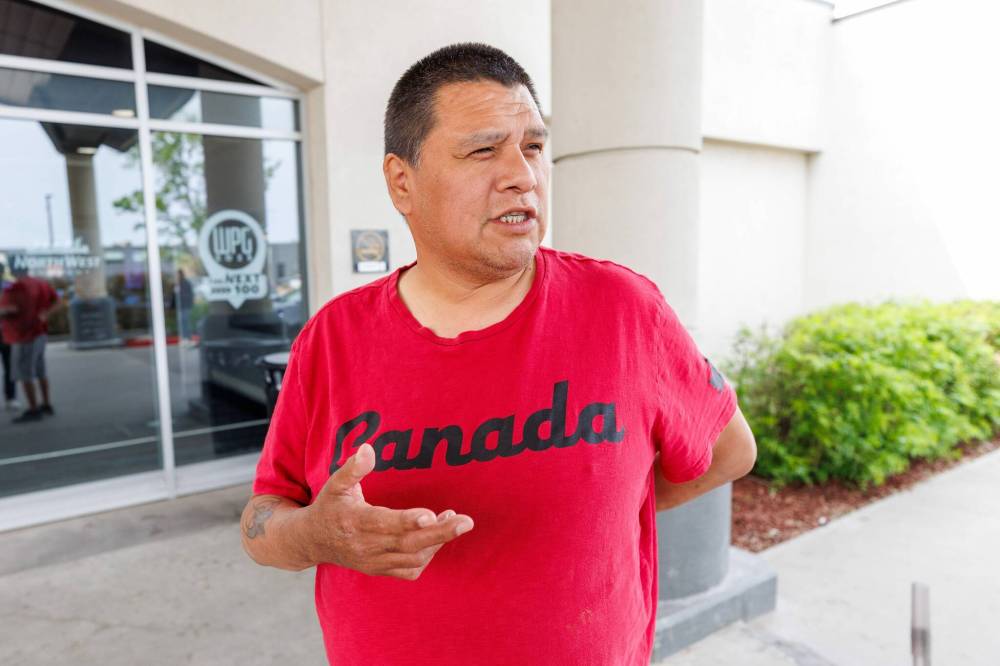
After spending the night at the Victoria Inn Hotel and Convention Centre, the family was heading back to the nearby airport, where they would board a plane to take them home.
A planned layover in Toronto meant they would not get there until at least Friday, making for three long and stressful days of travel, Selma said.
Harvey Hunter, 62, evacuated from Wabaseemoong First Nation (Whitedog), Ont.
Hunter and his partner fled their Ontario home, located about 10 kilometres east of the Manitoba border, two weeks ago, as a wildfire in Whiteshell Provincial Park raged nearby.
“We were just scrambling and took off,” he said, describing how they fled in their vehicle with little more than the clothes on their backs.
He smoked a cigarette in the parking lot of the Best Western Plus Winnipeg Airport Hotel Thursday afternoon, watching as fresh evacuees from northern Manitoba poured in.
The Red Cross had established a reception centre at the hotel, and many evacuees were staying on the building’s third floor, he said.
“I told them to hang in there. It’s OK, you just gotta hang in there, but you feel like you’re displaced and all that,” he said.
Hunter said he hoped to return home by June 7, but was feared high winds and temperatures might continue to fuel the fire, extending his stay in Manitoba’s capital.
Ian Bighetty, 25, travelled from Thompson to Winnipeg
Bighetty brought his wife and four young kids to Winnipeg last weekend, hoping to have a short vacation. The family was unsure whether it was wise to return to Thompson, which has been inundated with evacuees from the northern region, he said.
MIKE DEAL / FREE PRESS Ian Bighetty said his family would extend their stay in Winnipeg for at least a few days, and then decide how best to proceed.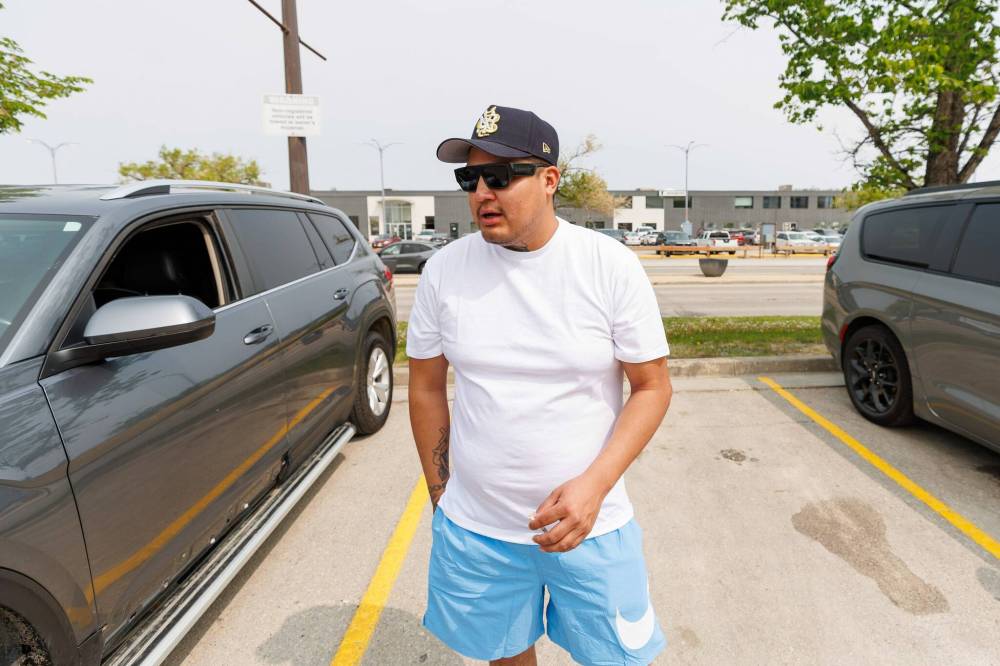
Thompson is not currently under threat from fire, but the community has been subject to the same tinder-dry conditions as most of the province, placing many people in the community on edge, Bighetty said.
A statement on the City of Thompson Facebook page urged residents to remain vigilant, warning seven intentionally set grass fires had been sparked in the community on Tuesday alone.
“My mom is pretty scared about that,” Bighetty said. “I mean, that was unexpected.”
Bighetty said his family would extend their stay in Winnipeg for at least a few days, and then decide how best to proceed.
Brent Colomb, 31, travelled from Mathias Colomb Cree Nation to Winnipeg
Colomb breathed a sigh of relief when he stepped onto the tarmac at the Premier Airspace hangar after a short flight from his home community.
“As long we made it out — me and my uncle — and hopefully everybody else make it out safely too,” he said.
MIKAELA MACKENZIE / FREE PRESS This is Brent Colomb’s second evacuation in just as many years.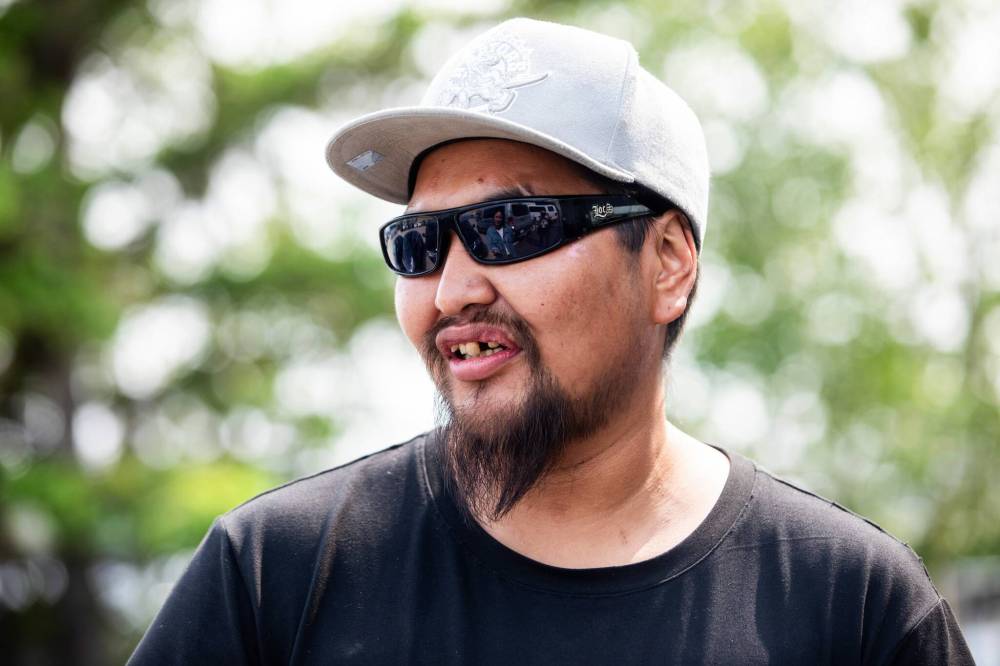
Colomb escorted his elderly uncle on the trip south and left his wife and nine children behind. Mathias Colomb was in the process of evacuating priority patients before getting others from the community to safety.
This is Colomb’s second evacuation in just as many years. In 2023, he and his family took a train to Norway House before taking a plane to Winnipeg because of nearby fires.
He knew this year’s evacuation was imminent when he woke up and saw a red glow across the horizon in the community.
“I said, ‘Look, uncle, it’s coming. The wind is blowing again,’” Colomb said.
Cory Beardy, 36, travelled from Mathias Colomb Cree Nation to Winnipeg
“It’s been a lot of anxiety,” Beardy said while smoking a cigarette outside the Premier Airspace hangar after a flight to Winnipeg from his First Nation community.
“I don’t even know what happened.”
Beardy was evacuated as a priority patient; he’s spent the last two years in hospital with various illnesses, and was in a coma for six months.
Elders, mothers, pregnant women and sick and disabled people were all flown out of the community as a priority. Others will follow throughout the day.
After a long day, Beardy still needed to register with the Red Cross, but he didn’t know where he and his brother would lay their heads Thursday night.
“I just don’t know anything,” he said.
— Compiled by Nicole Buffie, Tyler Searle and Matthew Frank
fpcity@freepress.mb.ca











